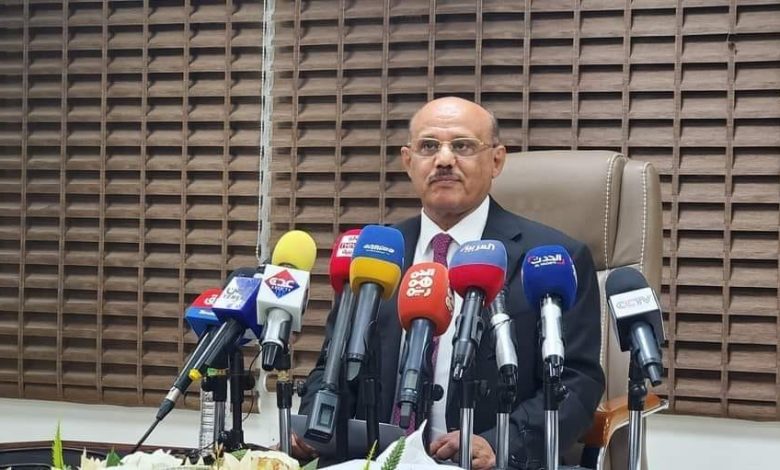Yemen’s central bank governor: We have stopped dealing with banned banks, including salary payments

Yemen Monitor/News Room
The governor of the Central Bank of Yemen in Aden said on Friday that the bank’s management will stop all government dealings with banned local banks, including the disbursement of salaries that were previously disbursed through them.
“The decisions to ban banks dealing with the Houthis are the first gradual sanctions,” said bank governor Ahmed Ghaleb al-Maqbi, at a press conference held in the temporary capital, Aden. He warned of taking more serious measures if these banks continue to deal with the Houthis, who are classified as a terrorist group.
“We have allowed banned banks to deal with depositors until further notice,” he added.
He continued: “We have communicated the decision to ban dealing to all banks and international banks, and they will not deal with banks that are under the control of the Houthi militias, which are classified as a terrorist group.”
He pointed out that the central bank has documented 20 violations by the Houthi group against the banking sector, threatening with new escalatory decisions if the deadline for depositing the old currency has expired.
He noted that “the decision to transfer the main banks to Aden is a Yemeni sovereign decision, of a monetary and banking nature, and has no connection to the regional or international situation, as the Houthis claim, and has nothing to do with Gaza war.”
The governor of the central bank revealed that there is a new currency in circulation, adding: “We have directed all banks in the legitimate areas to accept the currency and exchange it, as it is an old and worn-out currency.”
The bank governor warned against trying to exploit the decision to settle scores with the banks covered by the decision, explaining that these banks are the largest banks operating in Yemen and have not committed any money laundering or terrorist financing crimes, otherwise they would have been stopped and closed permanently.
“These banks were subjected to pressure from a group classified as a terrorist and failed to regularize their situation within the period granted to them to transfer their headquarters to the temporary capital, Aden,” he said, reassuring depositors in those banks that their work continues to serve the public in the liberated areas and that the central bank is the guarantor of their money.”
He accused the Houthis of creating an economic recession in the areas they control and imposing a fictitious exchange rate through which they plunder citizens’ savings and remittances.
He pointed out that “the Houthis issued a law called (Prohibition of Usury Transactions) and converted citizens’ deposits into current accounts that cannot be withdrawn, which caused citizens to lose their savings and exposed the banking sector to collapse.”
On Thursday evening, the central bank in Aden stopped dealing with the following banks: Tadhamon, Yemen and Kuwait, Yemen Bahrain Comprehensive Bank, Amal for Microfinance, Al-Kuraimi, Yemen International. It also gave a 60-day grace period for citizens and institutions to deposit what they have of the old edition before 2016 with it and other banks.
Commenting on this, the leader of the group, Abdulmalik al-Houthi, said that “the pressure on banks in Sana’a comes as part of US steps in support of the Israeli entity.” He considered in a televised speech that this was “an aggression on the economic field and an aggressive step and a dangerous game.”




